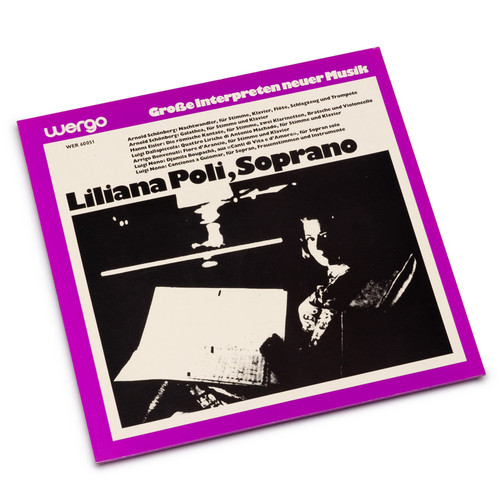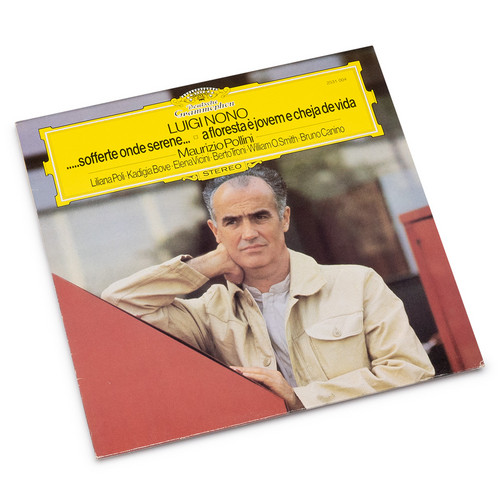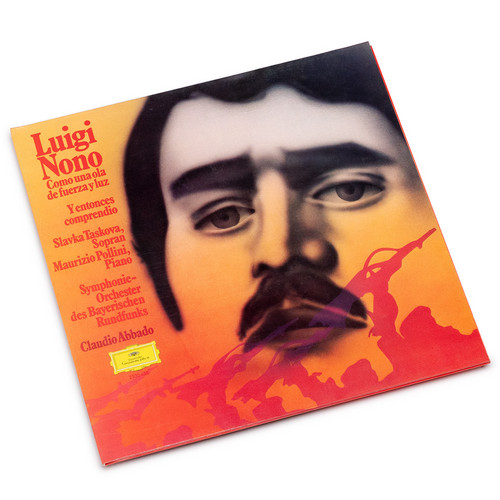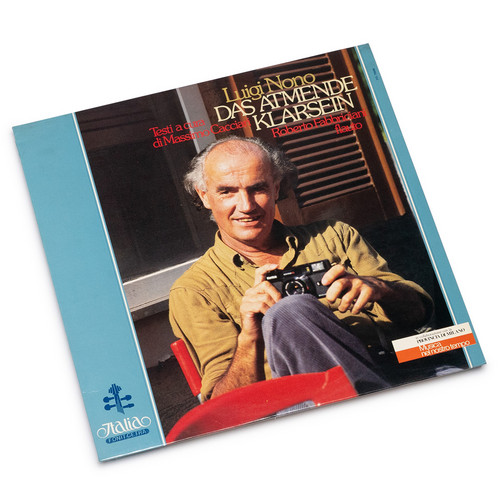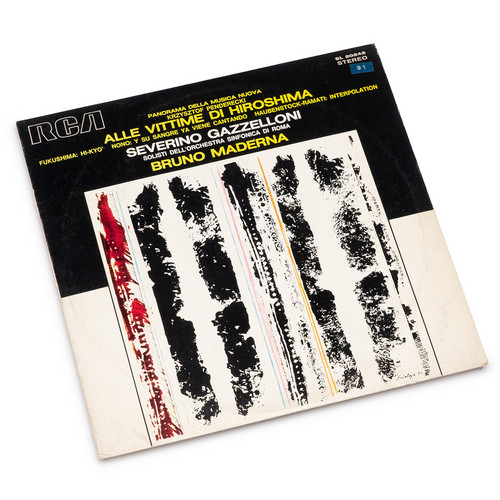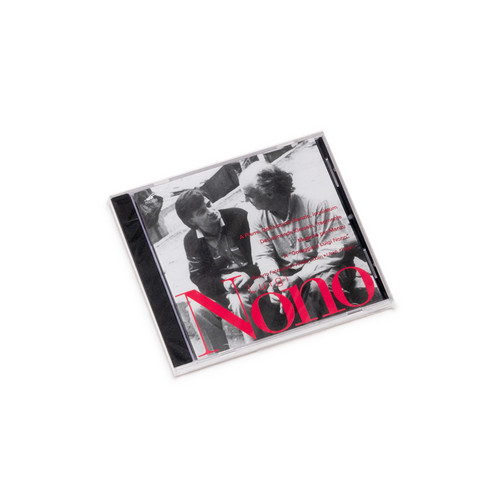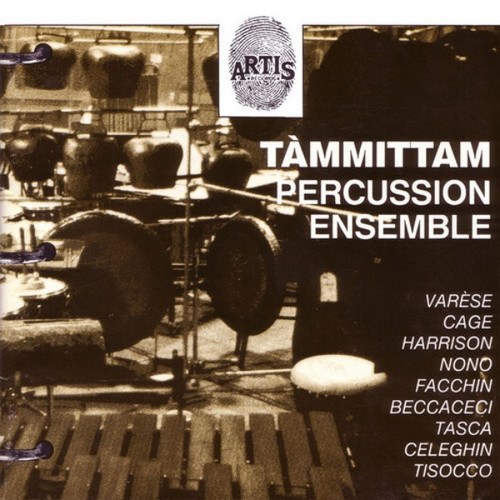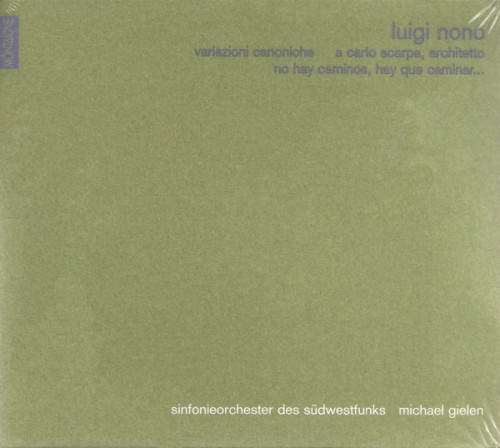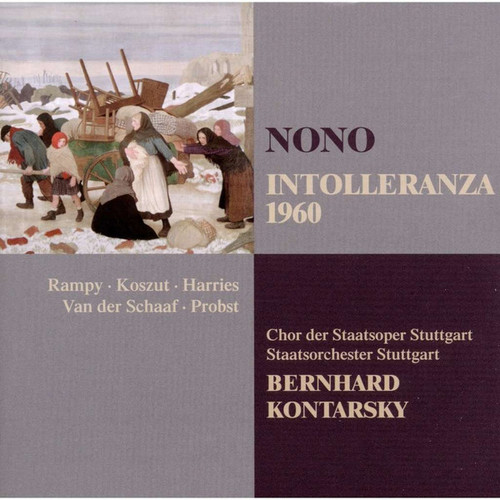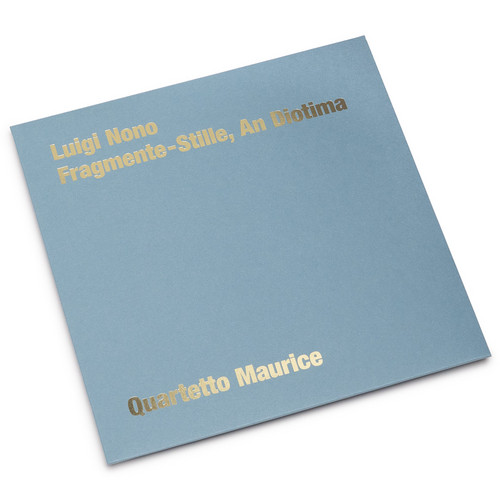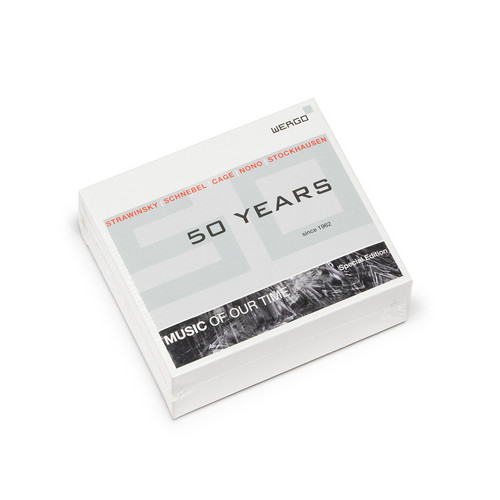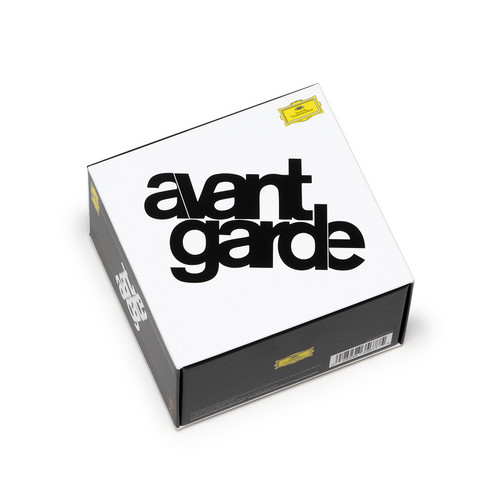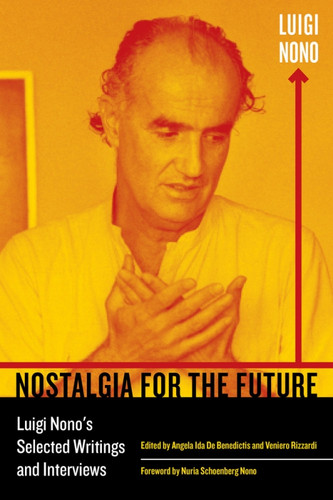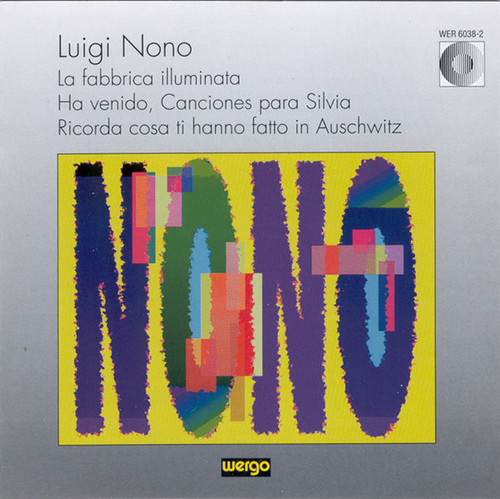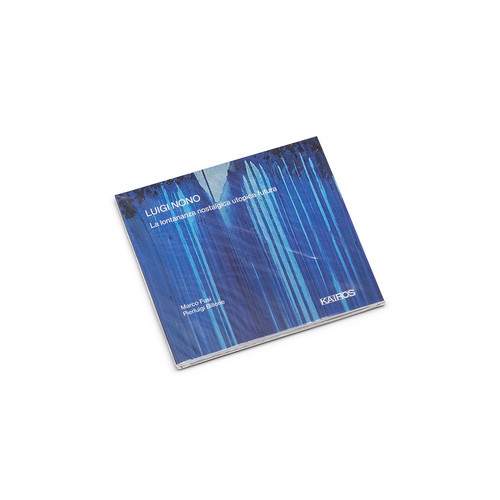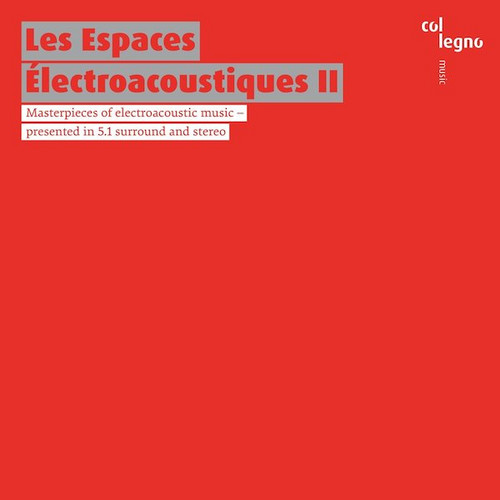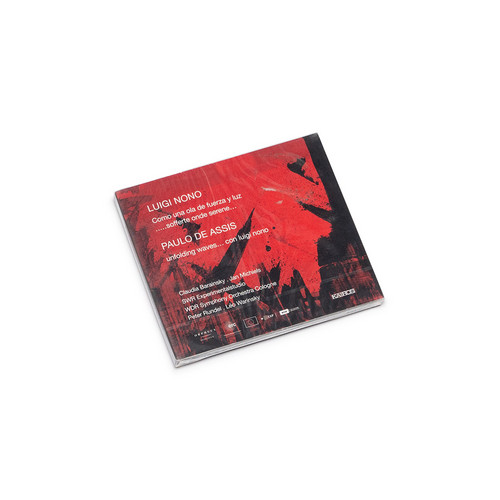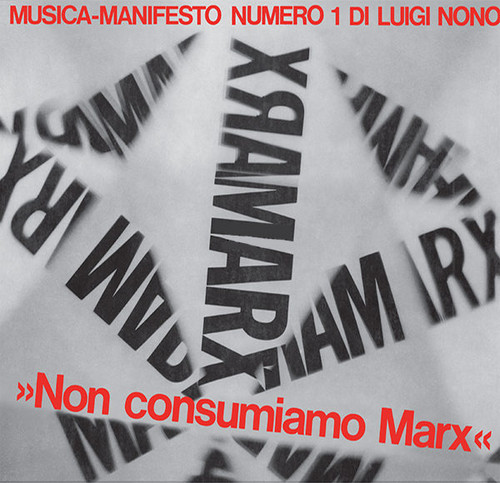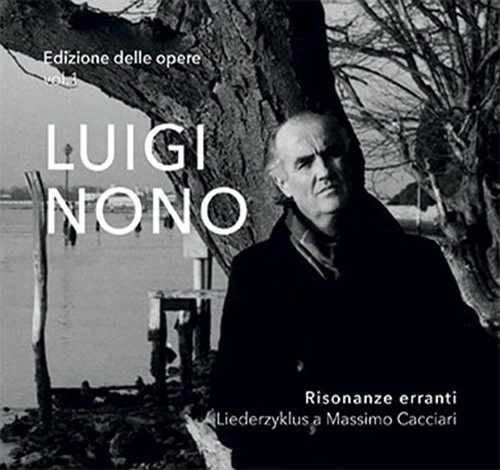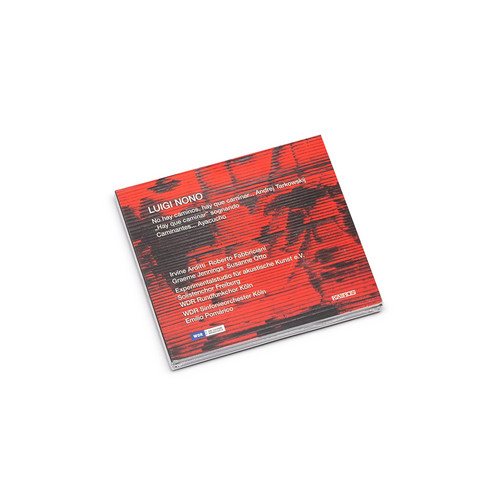Luigi Nono
Luigi Nono's avant-garde partisanship was inseparable from a commitment to socialism, twin aspects of a revolt against bourgeois culture: hence his avoidance of normal concert genres in favour of opera and electronic music, his frequent recourse to political texts and his work in bringing music to factories.
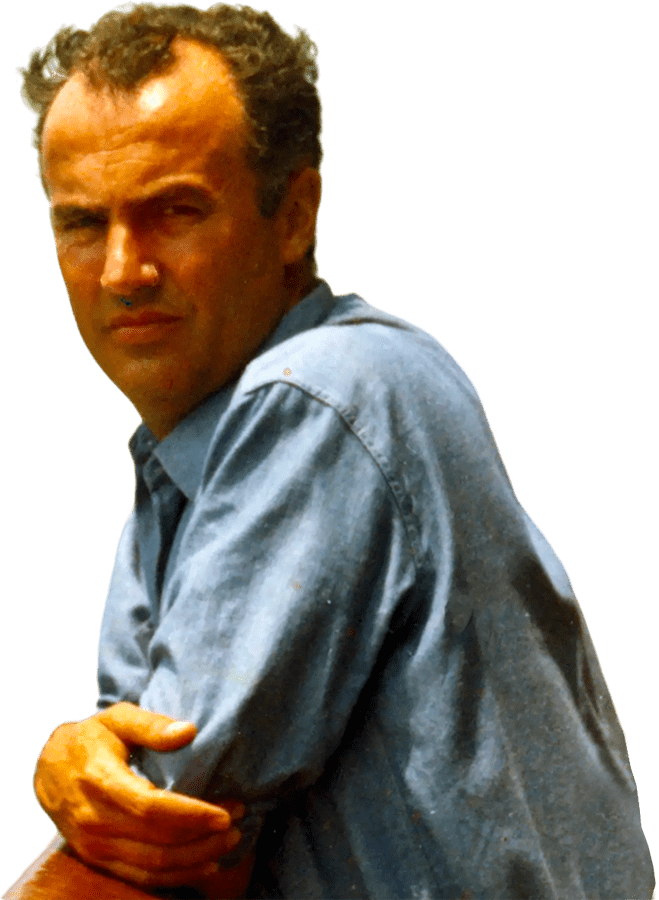
Luigi Nono's avant-garde partisanship was inseparable from a commitment to socialism, twin aspects of a revolt against bourgeois culture: hence his avoidance of normal concert genres in favour of opera and electronic music, his frequent recourse to political texts and his work in bringing music to factories.
Soprano (LP)
The Italian soprano beautifully sings works for voice and instruments by Arnold Schönberg, Hanns Eisler, Luigi Dallapiccola, Arrigo Benvenuti and Luigi Nono on this 1970 LP on Wergo's great "Studio Reihe Neuer Musik" experimental music series.
.....Sofferte Onde Serene... / A Floresta È Jovem E Cheja De Vida (LP)
condition (record/cover): M/EX Includes 4-page LP-size insert. This essential Deutsche Grammophon release presents two defining works by Luigi Nono (1924-1990), towering figure of post-war Italian modernism. .....sofferte onde serene... (1976), dedicated to Pollini and his wife Marilisa, is a haunting meditation for piano and magnetic tape, recorded at Munich's Herkulessaal. Inspired by the bells of Venice's Giudecca and marked by personal tragedy, the work achieves profound beauty through the d…
Como Una Ola De Fuerza Y Luz / Y Entonces Comprendió (LP)
condition (record/cover): EX/EX. Luigi Nono's shattering Como una ola de fuerza y luz (1971-72) mourns Luciano Cruz, young leader of Chile's Revolutionary Left Movement (MIR), who died tragically at 27. This monumental work for soprano, piano, orchestra, and magnetic tape – dedicated "para vivir" (that he may live) – unleashes waves of orchestral violence, haunting tape interventions, and piercing vocal lines from texts by Argentine poet Julio Huasi. Maurizio Pollini's piano cuts through with ha…
Das Atmende Klarsein (LP)
condition (record/cover): M/EX Includes 8-page LP-size insert. Luigi Nono's Das atmende Klarsein (1980-83) inaugurates the composer's final creative phase – a profound turn toward fragility, spatial listening, and live electronics. Composed for bass flute, small choir, and live electronics in intense collaboration with flutist Roberto Fabbriciani at Freiburg's legendary Experimentalstudio of the Heinrich-Strobel-Stiftung, this visionary work explores the very limits of perception. Texts drawn fr…
Alle Vittime Di Hiroshima (LP)
condition (record/cover): VG+ (record looks near mint but has some surface noise) / VG+ (small tag on front + light wear) Political consciousness meets avant-garde innovation. This Italian RCA Red Seal release dedicates itself to the victims of Hiroshima through landmark compositions of social protest and sonic experimentation. Bruno Maderna (1920-1973), conductor and co-founder of Milan's Studio di Fonologia, leads the Soloists of the Rome Symphony Orchestra with flutist Severino Gazzelloni in …
Luigi Nono Volume 2: Works with Flute
Luigi Nono (1924 –1990) was a great innovator in the use of spatialization of sound and experimentation with performance space, non-linear time and the collapsing between sound and silence. Beginning in 1959, he distanced himself from serial orthodoxy and the Ferienkurse compositional scene. His new works reflected a concern in political and cultural events and introduced the use of tape and electroacoustic technology. His compositional process was increasingly involved with specific performers,…
Tàmmitam Percussion Ensemble
1990 release (RARE) **
Ionisation (1933) Edgar Varèse 5:58Trio (1936) John Cage 3:56Canticle (1939) Lou Harrison 4:13Polifonica Monodia Ritmica (1951) Luigi Nono 8:50Gloria E Morte (Words By Marco Luzzi) Guido Facchin 1978 11:21Concerto Da Camera(1986) Roberto Beccaci 9:43Pavone, Mulo, Volpe (1987) Saverio Tasca 5:00Il Respiro Della Notte (Liric By Elena Budini) Luigi Celeghin (1989) 3:55Omaggio A Giocando Duchamp Vinci Leonardo Alfredo Tisocco (1975)
Variazioni Canoniche / A Carlo Scarpa, Architetto / No Hay Caminos, Hay Que Caminar...
2000 release ** "“To awaken the ear well” was one of the goals of Luigi Nono in his last creative period, the 1980s and 20th century. Between pianissimo and complete silence, the listener is invited to unexpected sound adventures. Tense intensity with a sparse expression goes together with the breaking of clear coherence in a very concentrated and targeted manner. As one of his first works, the Variazioni from 1950 derives its substance from Arnold Schönberg, his posthumous father-in-law. The us…
Intolleranza 1960
2025 stock ** "Intolleranza 1960 was Luigi Nono's first work for the opera stage and is a flaming protest against intolerance and oppression and the violation of human dignity. The year in the title refers to the time of the work's origin. Nono himself said of this work that it "did mark a beginning for me, but in no sense did it constitute a tabula rasa or in response to 'divine inspiration'". It was commissioned for the 1961 Venice Biennale by its director Mario Labroca. The first performance …
Fragmente - Stille, An Diotima
** Edition of 300 copies, gold foil printed sleeve, includes 12-page booklet and 2 leporello inserts printed on translucent paper ** Since their founding during the early years of the new millennium, the Italian imprint, Holidays Records, has stood at the vanguard of forward-thinking sound, building a carefully curated catalog of releases that collectively build context and conversation across numerous avenues of exploration - contemporary and historical sitting side by side - within the wider f…
50 Years
In 2012, the Wergo label celebrates its 50th anniversary. For half a century, Wergo has been synonymous with contemporary music. The label's catalog reads like a virtual who's-who of modern music, both in terms of composers and performers. From the beginning, the intent of founder Werner Goldschmidt (from whom the label derives its name) was to provide listeners with a snapshot of current musical activity and innovation. Goldschmidt's label and mission, now managed by the publisher Schott, is ma…
The Avantgarde Series
The legendary DG Avantgarde vinyl series (1968-1971) is turning 55! In order to celebrate this occasion, the series is now released on 21 CDs for the first time. The Avantgarde series serves as a historical document for a time of radical change in musical thinking and the breaking of artistic boundaries. The question "What is music?" confronted many of the composers and musicians involved in the series, and the anti-authoritarian spirit of the 1960s and 1970s was a palpable influence. Deutsche G…
Nostalgia for the Future Luigi Nono's Selected Writings and Interviews (Book)
Nostalgia for the Future is the first collection in English of the writings and interviews of Luigi Nono (1924–1990). One of the most prominent figures in the development of new music after World War II, he is renowned for both his compositions and his utopian views. His many essays and lectures reveal an artist at the center of the analytical, theoretical, critical, and political debates of the time.This selection of Nono’s most significant essays, articles, and interviews covers his entire car…
La Fabbrica Illuminata / Ha Venido, Canciones Para Silvia / Ricorda Cosa Ti Hanno Fatto In Auschwitz
*2022 stock* Magnetic tape for serial use is not the prerogative of Stockhausen or the French members of the GRM. On the other side of the Alps, at the RAI Studio di Fonologia in Milan, Luigi Nono worked for a long time on the development of a new form of theatrical composition. In the 1960s, his research led to the creation of a series of works that are difficult to classify: A floresta è jovem e cheja de vida (1966), Y entonces comprendió (1969-70), but especially La fabbrica illuminata from 1…
La lontananza nostalgica utopica futura
Experiencing La lontananza utopica futura has enriched my musicianship. The unusual openness of the original materials by Nono required the establishment of an interpretive path through tapes and scores. This need has led to the emergence of a creative approach to performance, where the lines between roles and figures are blurred; with La lontananza, we cannot identify the composer as the provider of clear and direct instructions, and the performer cannot remain an invisible score-reproducer. A …
Les Espaces Électroacoustiques II
The idea of exploring important 20th century electro-acoustic compositions within their historically informed performance practices, and using this as the basis for the production of a new interpretation in 5.1 surround sound, has created quite a stir. It originated at the Institute for Computer Music and Sound Technology (ICST) at the Zurich University of the Arts, and found its expression in the double SACD Les Espaces Électroacoustiques I. — This album now brings us further milestones of ele…
Como una ola de fuerza y luz - Unfolding Waves
Between April and June 1971, after the democratic election of Salvador Allende’s government, Luigi Nono visited Chile for three months, meeting several artists, composers and politicians, among whom was Luciano Cruz Aguayo, one of the leaders of the Movement of the Revolutionary Left (MIR, Movimiento de Izquierda Revolucionaria). Back in Italy, Nono started working on his next musical composition, which was meant to be a piece for piano and orchestra, for Maurizio Pollini and Claudio Abbado. In …
Musica Manifesto n. 1
**First ever repress of this seminal work.** LP version, edition of 300 copies on black vinyl. Long considered, with Pierre Boulez and Karlheinz Stockhausen, to be one point in the trinity of the post-war avant-garde, Luigi Nono was, without question, one of the most important and singular composers to emerge in the years following the Second World War – defining the zeitgeist, taking the his idiom into startling new territories, while standing decidedly apart. Nono’s music infused the avant-gar…
Risonanze Erranti
*Super Audio CD* The poetic significance of Luigi Nono's Risonanze Erranti (1985-87) should be interpreted in the light of the reflections developed since the summer of 1975 with the venetian friend and philosopher massimo cacciari, to whom the work is dedicated.after Al Gran Sole carico d'amore (in the bright sunshine heavy with love) (1972-74) nono, obsessed by a sense of anguish owed to his solitude and his activism frustrated by the stagnation of italian music institutions, felt the need to …
Caminantes... Ayacucho
2007 release - Luigi Nono No hay caminos, hay que caminar … Andrej Tarkowskij (1987) “Wayfarer, there is no path. Yet you must walk”, in Spanish: “Caminante, no hay caminos. Hay que caminar.” These words are the contents of an inscription, which Luigi Nono read on the wall of a monastery in Toledo in the middle of the 1980s. They must have affected him most deeply, since in the last three years of his life he made them the basis of the titles of a trio of works. In “Hay que caminar” he surely re…
